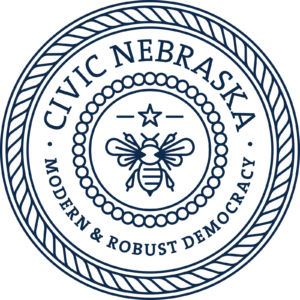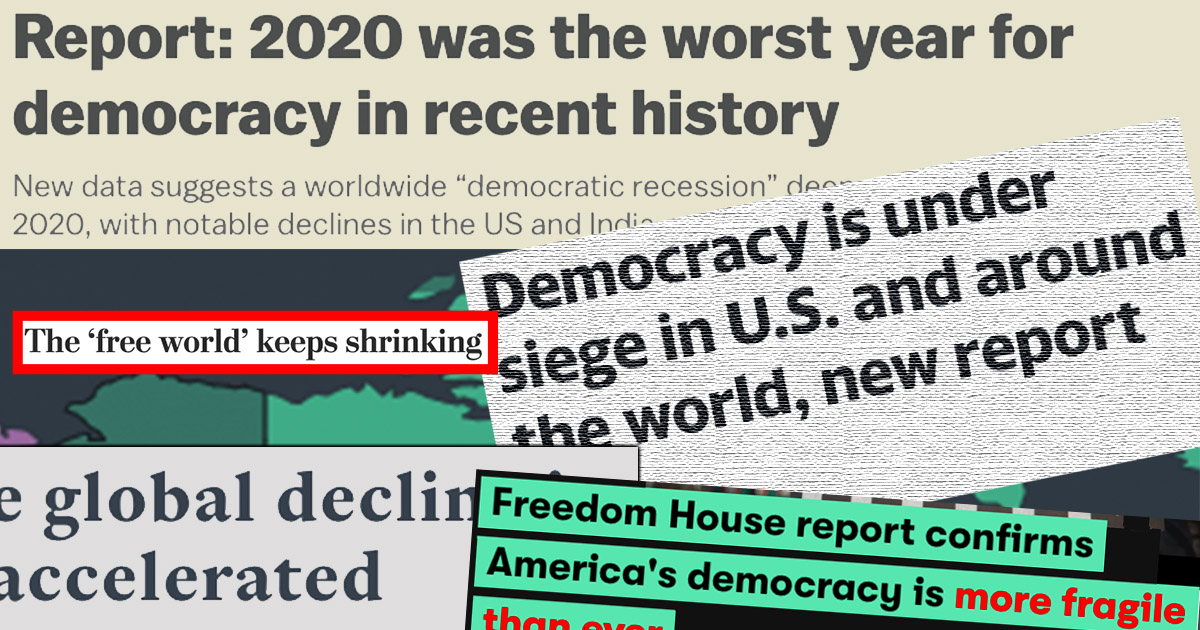Amid the waves of information we all deal with every day, it’s understandable if these headlines haven’t immediately risen to the top of everyone’s news feeds this week. But they’re important.

That tends to get one’s attention, doesn’t it?
“The long democratic recession is deepening,” says the report from Freedom House, a U.S.-based nongovernmental organization that defends human rights and promotes democratic change. The group’s “Freedom in the World” report, which has been published every year since 1973, was issued this week. It has now registered 15 straight years of decline in global freedom.
We won’t spend the entirety of this post recounting this dubious milestone. The full report is here, and we invite you to read it if you can. In short, freedoms in 73 countries declined in 2020, while only 28 saw improvements. That’s the worst single year in this 15-year period on that particular metric.
What does that have to do with the price of grain in Hastings? Because, as the report shows, a democratic backslide is also happening here – the United States was among the nations experiencing a notable democratic decline in 2020.
Of course, anyone who was conscious in the previous calendar year knows this. The report details several reasons why: political corruption, conflicts of interest, lack of governmental transparency, and steady assaults – figurative and literal – on American democratic institutions. All told, on a scale of 1 to 100 (with 100 being a model democracy) the United States scored an 83 in 2020. Not a shameful number, until you look back 10 years and realize that in 2010, we scored a 94. Methodology
Plus, it’s a simple fact that what happens here matters around the world. According to the report:
The exposure of U.S. democracy’s vulnerabilities has grave implications for the cause of global freedom. Rulers and propagandists in authoritarian states have always pointed to America’s domestic flaws to deflect attention from their own abuses, but the events of the past year will give them ample new fodder for this tactic, and the evidence they cite will remain in the world’s collective memory for a long time to come. After the Capitol riot, a spokesperson from the Russian foreign ministry stated, “The events in Washington show that the U.S. electoral process is archaic, does not meet modern standards, and is prone to violations.” Zimbabwe’s president said the incident “showed that the U.S. has no moral right to punish another nation under the guise of upholding democracy.”
In other words, the world is better off when the United States is better off. And a more democratic world, in turn, benefits Americans (and Nebraskans). From more equitable economies to fairer markets to increased trade to stability in strategic alliances, a robust democracy at home makes the world more “friendly, stable, and secure.”
Authoritarians around the world are shedding no tears because of this new report. But this trend’s continuation is not inevitable. Far from it, in fact. Because democracy has something that autocracy will never possess: A modern record of success and progress that, while messy and uneven, is clear. Democracy prevails because it is better than authoritarianism at meeting the challenges of governing and empowering its citizens. The strength of American democracy matters to the strength of global democracy – and that means what happens in our state matters to the world.
For decades, environmentalists have rallied around the term “Think global, act local.” It’s the same with democracy. In fact, that’s why Civic Nebraska exists: to foster the connections, innovations, and actions that strengthen our democratic systems and structures. Local thought and local action is core to our mission.
As you peruse the Freedom House report, try to consider what everyday individual acts that you and your networks can take to fortify our democratic norms, systems, and institutions. We always have suggestions on how to get involved through our Youth Civic Leadership, Civic Health, and Voting Rights programs, of course, and we’re happy to have you join our ranks.
At the end of the day, democracy is resilient – if we choose it to be. And as Americans, we have a special responsibility to protect global freedoms. Our democratic confidence radiates across oceans and over national borders. But it must originate inside each of us.



